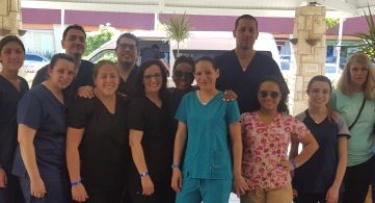Medical Mission to Antigua: “An Eye-Opening Experience”

In March, a group of Mercy students and faculty from the School of Health and Natural Sciences traveled to Antigua, an island in the West Indies, as part of their fieldwork in occupational therapy, physical therapy and communication disorders. Applying skills and knowledge learned in the classroom to their hands-on clinical work with patients with severe cognitive and physical disabilities, participants had a life-changing experience, one they will never forget.
The week-long trip was coordinated by Cristina Dumitrescu, assistant professor and program director of Mercy’s Occupational Therapy Associate (OTA) program in collaboration with the Dean of the American University of Antigua. The group provided therapeutic interventions in medical and residential facilities that serve children and adults with conditions like cerebral palsy, autism, blindness, seizures and neurological diseases.
Peter Yusef will graduate in 2019 with his OTA degree, with plans for a career in a pediatric setting. A few years ago, he spent two weeks in Ghana volunteering with members of his church, so when Dumitrescu announced the Antigua trip, he jumped at the chance.
“One child with severe cerebral palsy had been given a wheelchair that didn’t fit her body,” he said. “We spent two days working on the chair, adapting it to her abilities and needs, using the available materials and resources, which were not much. On our return visit, we saw the child sitting upright in the wheelchair and smiling. She finally felt comfortable, and that made her happy.”
Carmen Hernandez, another OTA student on the trip, was struck by the high level of cognitive development exhibited by the patients they saw. “Even without the proper resources, their compensating strategies were phenomenal,” she said. “They use whatever they have. Their determination was so inspiring. It helps you appreciate what you have.”
The group rotated among three sites in Antigua: the NSA Medical Surgical Rehab Centre (NSA), The Care Project, a former orphanage serving people with disabilities ranging in age from infants to adults, and Friends of The Care Project, a nonprofit that provides specialty care for the same population. “These children never received any type of skilled therapy and have significant functional delays. Their difficulties with communicating, walking, and sitting upright in a chair made it difficult for their caregivers to feed them or interact with them,” said Dumitrescu.
Patrick Matthew DPT, Ph.D., head of the NSA Outpatient Clinic, guided all interactions and scheduling of treatment sessions to allow students a chance to work with patients with a variety of diagnoses. Dumitrescu and a group of students spent four days at the outpatient clinic, where they reviewed medical charts, interviewed patients and provided hands-on treatment.
At The Care Project, Mercy professors Sharon Sedlak (OTA), Kathy Ryan (DPT) and Kaitlin Brooks (CD) and their students brought medical and classroom supplies and sensory toys to use with children in need of rehabilitation. Several students chose to work on feeding and positioning the children so they could more easily interact with their caregivers.
“From the beginning I knew the trip to Antigua would fit with Mercy’s goal to provide transformational learning experiences for students,” Dumitrescu said. “Seeing the conditions in those health care facilities provided students with a taste of true cultural diversity. They saw first-hand what people face in other countries. Putting in those hours in a real clinic, serving the needs of people who are so grateful, is a great eye-opener. You can’t learn that from any book.”
